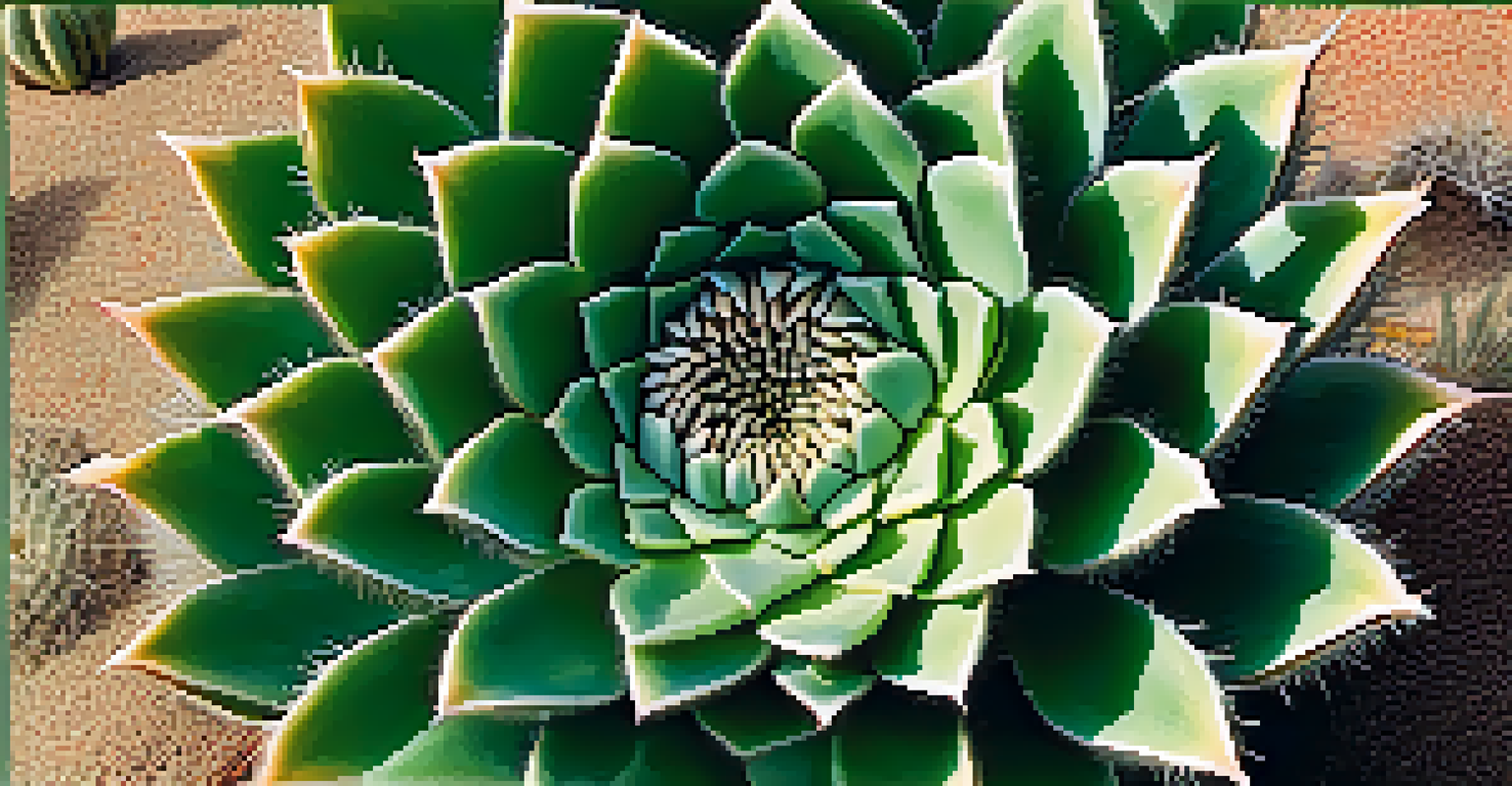Peyote and Depression: A Study of Therapeutic Effects

Introduction to Peyote and Its Historical Use
Peyote is a small cactus with psychoactive properties, primarily known for its use in traditional Native American rituals. This cactus contains mescaline, a compound that has garnered attention for its potential therapeutic effects. Historically, peyote has been used not just for spiritual experiences but also as a means to cope with various mental health issues.
The use of peyote in therapeutic settings can facilitate emotional healing and support mental well-being.
The significance of peyote in indigenous cultures speaks volumes about its role in mental well-being, often utilized in ceremonies aimed at promoting healing and balance. As modern society begins to explore alternative therapies, the spotlight is back on peyote and its possible benefits for conditions like depression.
Understanding the cultural and historical context is crucial when discussing peyote's therapeutic potential. It highlights the importance of respecting traditional practices while also investigating the scientific aspects of its effects on mental health.
Understanding Depression: A Complex Mental Health Challenge
Depression is more than just feeling sad; it's a complex mental health disorder that affects millions of people worldwide. Symptoms can range from persistent sadness to a loss of interest in previously enjoyed activities, and it can severely impact daily life. Understanding depression's multifaceted nature helps in exploring various treatment options, including the potential role of psychedelics like peyote.

Many traditional treatments for depression, such as antidepressants, can take weeks to show effects and may come with side effects. As a result, researchers are increasingly looking for quicker, more effective alternatives. This has led to renewed interest in psychedelics, which may offer a different approach to treating mental health disorders.
Peyote's Role in Mental Health
Peyote, containing mescaline, is being revisited for its potential therapeutic benefits in treating depression and enhancing mental well-being.
By examining the underlying mechanisms of depression, we can appreciate how alternative therapies, including peyote, might provide relief. This insight paves the way for understanding how psychedelics could complement or enhance existing treatment methods.
Psychedelics and Their Impact on Mental Health
Psychedelics, including peyote, have shown promising results in treating various mental health conditions, particularly depression and anxiety. These substances can alter perception and consciousness, leading to profound experiences that can facilitate emotional healing. Research indicates that psychedelics may help 'reset' the brain, providing a fresh perspective on life and experiences.
Psychedelics can provide a new lens through which individuals can view their life and struggles.
Studies have suggested that psychedelics can increase neuroplasticity, which is the brain's ability to adapt and change. This change might help individuals who have been stuck in negative thought patterns break free and find new ways to cope with their emotions. Understanding this mechanism could be key in harnessing peyote's therapeutic potential.
Moreover, the therapeutic use of psychedelics often occurs in a controlled and supportive environment, enhancing their effectiveness. This approach not only focuses on the drug itself but also emphasizes the importance of the therapeutic setting and guidance.
Research on Peyote and Depression: Current Findings
Recent studies have begun to explore the relationship between peyote and depression, although research is still in its infancy. Early findings suggest that mescaline may help alleviate symptoms of depression, offering hope to those who have not found relief through conventional treatments. However, more comprehensive studies are needed to fully understand its efficacy and safety.
One notable study indicated that participants reported significant reductions in depressive symptoms after peyote use, often accompanied by a sense of clarity and emotional release. This aligns with anecdotal reports from individuals who have used peyote in therapeutic settings, highlighting its potential as a tool for healing.
Psychedelics and Emotional Healing
Studies suggest that psychedelics like peyote can provide profound emotional healing by 'resetting' brain patterns and increasing neuroplasticity.
While the initial findings are promising, the complexity of mental health treatment requires careful consideration. Continued research is vital to establish the correct dosage, potential side effects, and long-term impacts of peyote on mental health.
The Neurochemical Effects of Mescaline
Mescaline, the active compound in peyote, interacts with serotonin receptors in the brain, which play a crucial role in mood regulation. This interaction may lead to enhanced mood and emotional well-being, explaining why some individuals report relief from depressive symptoms after using peyote. Understanding these neurochemical effects is essential for grasping how peyote could contribute to mental health treatment.
Moreover, the psychedelic experience itself can lead to insights and emotional catharsis, allowing individuals to confront and process unresolved issues. This therapeutic journey can be transformative, offering a new lens through which one can view their life and struggles.
However, it's important to approach the use of mescaline with caution, as individual responses can vary widely. The complexity of these interactions highlights the need for further studies to determine the most effective and safe ways to use peyote in treating depression.
Integration of Peyote Therapy in Mental Health Practices
As interest in alternative therapies grows, the integration of peyote into mental health practices is becoming a point of discussion. Some therapists are exploring the use of psychedelics in controlled environments, aiming to combine traditional therapeutic techniques with the profound experiences that peyote can offer. This holistic approach may enable clinicians to support patients in deeper emotional work.
Creating a safe and supportive environment for individuals using peyote is paramount. Therapy sessions can be designed to help patients navigate their experiences, allowing them to process emotions and insights that arise during their journey. This integration could enhance the overall therapeutic experience and lead to more significant, lasting changes.
Research on Peyote's Efficacy
Early research indicates that peyote may alleviate depressive symptoms, but further studies are needed to establish its safety and effectiveness.
However, this shift also raises ethical and legal considerations. As we explore the potential of peyote in therapy, it's crucial to balance innovation with the need for responsible use and respect for indigenous practices.
Conclusion: Looking Forward to a New Era in Therapy
The exploration of peyote as a treatment for depression offers a glimpse into the potential of psychedelics in mental health care. While research is still ongoing, the initial findings suggest that peyote could play a significant role in helping individuals find relief from their symptoms. This renewed interest in alternative therapies marks an exciting shift in how we approach mental health treatment.
As we move forward, it's essential to continue advocating for thorough research and responsible practices surrounding the use of peyote. By honoring traditional practices while embracing scientific inquiry, we can create a more comprehensive understanding of its therapeutic potential.

The journey toward integrating peyote into modern mental health care is just beginning, and it holds promise for many seeking healing. With continued exploration and collaboration, we may soon uncover new pathways for those struggling with depression.